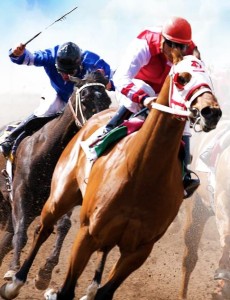NM takes another step cracking down on horse racing cheaters

TO CATCH CHEATERS: The New Mexico Legislative Finance Committee approved setting up a subcommittee to investigate ways to crack down on cheaters operating at the state’s horse tracks.
By Rob Nikolewski │ New Mexico Watchdog
SANTA FE, N.M. — The racehorses in New Mexico are swift, but the cheaters who dope them are slippery.
In another in a series of efforts to clean up the sport, the Legislative Finance Committee unanimously voted Friday to establish a subcommittee made up of lawmakers and horse racing officials across the state. It will look at ways to make sure sanctions against owners and trainers who violate the rules are handled more quickly.
“We need to swing a bigger hammer and send a stronger message,” said state Sen. George Muñoz, D-Gallup, who introduced the motion.
The New Mexico Racing Commission has tried to crack down on suspected cheaters, issuing about $500,000 in fines in the past 18 months, commission executive director Vince Mares told the LFC. But well over half of those fines have gone uncollected because the accused often appeal the fines, go to court and receive temporary restraining orders from judges.
“We receive (word) from the court saying you cannot take any sanctions against this individual until the court hears it,” Mares told New Mexico Watchdog. “So it’s in limbo and, unfortunately, it takes two or three years in some cases. I know one from 2009 that barely got resolved in 2013.”
Mares said about half of all doping cases are appealed.
One possible solution discussed Friday was assigning one judge to hear Racing Commission cases to speed things up.
“I think that would be great,” Mares said.
Among the duties of the subcommittee would be to look into whether such an idea would not violate the due process rights of the accused, as well as how much hiring a judge dedicated to hearing Racing Commission cases would cost taxpayers.
LFC director David Abbey said his staff would put together a preliminary report investigating horse racing in New Mexico in time for the LFC’s November meeting. The newly created subcommittee plans on meeting before the next legislative session begins in Santa Fe in January.
“I think there’s a real sense of urgency,” said Sen. Carlos Cisneros, D-Questa.
New Mexico is trying to clean up its reputation as a state where dishonest trainers flourish. Two years ago, a New York Times exposé claimed the state had the worst record in the country when it came to injuries to horses and jockeys.
Mares told LFC members Friday the Racing Commission files an average of five doping cases a week from New Mexico’s six licensed tracks and “well over 200 this year.”
One of the most widely used drugs is dermorphin, which is known as “frog juice” because it comes from an enzyme found on the backs of tropical frogs found in South America. The painkiller, considered to be considered 30 to 40 times more potent than morphine, is used to make horses run through whatever pain they may be experiencing.
WHO ARE THESE GUYS?: The New Mexico Racing Commission is investigating this photograph taken after the All American Futurity to determine if the two men are trainers who were supposed to be barred from the event.
Earlier this month, New Mexico Watchdog reported the Racing Commission is looking into a mysterious photo that appeared after the running of the All American Futurity, the biggest quarter horse race in the world that is held every Labor Day at Ruidoso Downs. The photo was first published by the Paulick Report, an online horseracing magazine.
Holding the race trophy, two men in the photo are suspected to be trainers banned 20 years from race tracks for drugging horses.
Mares said Friday the investigation continues. “I don’t want to get into the details of it but we’re looking into it … It’s more complex than we anticipated,” he said. “But it’s definitely going to be resolved one way or the other.”
Another issue is cracking down on “outlaw” or “bush” tracks, where horses race on unlicensed tracks often staged at an individual’s private ranch. Through text messaging, dozens and sometimes hundreds of people show up to place cash bets on races involving multiple horses or, sometimes, in match races featuring one horse against another. The conditions are rife for abuse.
“If a horse breaks a leg, they shoot it with a gun right there,” Muñoz said.
“Unfortunately, NMRC doesn’t have the authority to investigate these tracks,” Mares told the LFC. “State Police look at them … Some of these horses go to these bush tracks and get so doped up they have terrible accidents.”
To crack down on unscrupulous trainers and owners who avoid penalties by counterfeiting licenses, Mares said the NMRC is updating its database, has hired more investigators and is in the process of hiring an in-house auditor.
“There’s a bad perception that nothing is getting done,” Mares told the LFC. “But that’s not true. The tracks have stepped up … (but) there always seems to be a loophole.”
Here’s New Mexico Watchdog video of our interview with Mares after Friday’s hearing:







